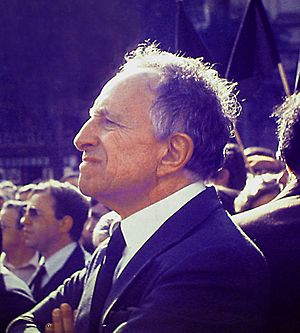Vasco Gonçalves facts for kids
Quick facts for kids
Vasco Gonçalves
OA
|
|
|---|---|
 |
|
| Prime Minister of Portugal | |
| In office 18 July 1974 – 19 September 1975 |
|
| President | António de Spínola Francisco da Costa Gomes |
| Deputy | José Teixeira Ribeiro António Arnão Metello |
| Preceded by | Adelino da Palma Carlos |
| Succeeded by | José Pinheiro de Azevedo |
| Minister of Education and Culture | |
| In office 29 November 1974 – 4 December 1974 |
|
| Prime Minister | Himself |
| Preceded by | Vitorino Magalhães Godinho |
| Succeeded by | Manuel Rodrigues Carvalho |
| Personal details | |
| Born |
Vasco dos Santos Gonçalves
3 May 1921 Lisbon, Portugal |
| Died | 11 June 2005 (aged 84) Almancil, Portugal |
| Political party | Independent |
| Spouse | Aida Rocha Afonso |
| Children | 1 daughter and 1 son |
| Alma mater | Portuguese Military Academy |
| Profession | Army officer |
| Awards | Order of Aviz Order Playa Girón |
| Military service | |
| Allegiance | |
| Branch/service | |
| Years of service | 1942–1975 |
| Rank | General |
| Battles/wars | Portuguese Colonial War Armed Forces Movement Carnation Revolution |
General Vasco dos Santos Gonçalves was a Portuguese army officer. He was born in Lisbon on May 3, 1921, and passed away on June 11, 2005. He played a big part in the Carnation Revolution, a peaceful change in Portugal. Later, he became the Prime Minister of Portugal, leading the country from July 18, 1974, to September 19, 1975.
Contents
Early Life and Military Career
Vasco dos Santos Gonçalves was born in Sintra, Portugal, on May 3, 1921. His father, Vítor Gonçalves, was a foreign exchange dealer. In 1942, Vasco graduated from the Portuguese military academy. He became an engineer in the Army Engineering Corps.
In 1950, he married Aida Rocha Afonso. They had a son named Vitor and a daughter named Maria João. As an officer, Gonçalves served in Portuguese Goa. He also spent time in the Portuguese overseas territories of Angola and Mozambique.
In 1973, Gonçalves joined the Armed Forces Movement. This group helped plan the overthrow of the Estado Novo regime. This regime had ruled Portugal for a long time.
Leading Portugal as Prime Minister
Gonçalves became Prime Minister of Portugal in 1974. His time as leader was a period of big changes and some challenges. He guided Portugal as it moved from a dictatorship to a democracy. This time was known as the Ongoing Revolutionary Process.
In early March 1975, some people tried to remove Gonçalves from power. This attempt by a right-wing group failed. After this, the Prime Minister made big changes to the economy. He took control of many important industries for the government.
These industries included banking, insurance, and oil companies. He also nationalized tobacco, cement, and wood pulp businesses. Other companies like iron and steel, breweries, and transport were also included. Even most radio and TV networks became government-owned.
In April 1975, the Socialist Party and its friends won many seats in the assembly. They did not agree with Gonçalves. They said he was too extreme in his left-wing views. They started protests against his government.
On August 18, Gonçalves gave a strong speech against his political rivals. Two weeks later, the country faced a risk of civil war. Because of this, President Francisco da Costa Gomes removed Gonçalves from his position.
Many people on the radical left in Portugal were upset by Gonçalves's removal. The Portuguese Workers' Communist Party organized large protests in Lisbon in September 1975.
Later Life and Legacy
After he was no longer Prime Minister, Gonçalves left politics. He sometimes attended events to support left-wing movements. His last public appearance was in 2004. He was at an event with Portuguese Prime Minister José Manuel Durão Barroso.
Vasco Gonçalves always remained an independent person. However, he believed in the ideas of Marxism.
Vasco dos Santos Gonçalves passed away on June 11, 2005. He was 84 years old. He drowned in his brother's swimming pool due to heart problems.
See also
 In Spanish: Vasco Gonçalves para niños
In Spanish: Vasco Gonçalves para niños
 | George Robert Carruthers |
 | Patricia Bath |
 | Jan Ernst Matzeliger |
 | Alexander Miles |


